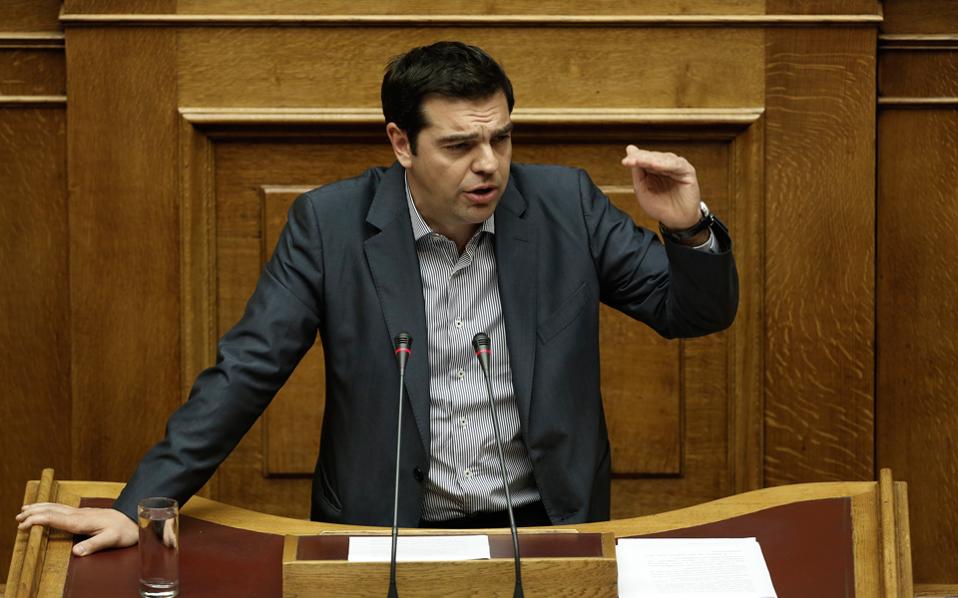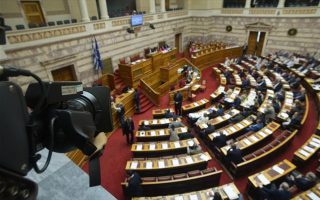Greece faces showdown with creditors as lawmakers back deal

Alexis Tsipras’s government is heading into a weekend of political wrangling in Brussels after winning the backing of Greek lawmakers to negotiate a deal that will keep the country in the euro.
Greece’s prime minister won overwhelming support for the package of spending cuts, pension savings and tax increases with a majority of 251 votes in the 300-seat parliament after securing backing from opposition parties. Germany has already indicated a new proposal would have to incude tougher conditions.
While the vote result provides evidence that the government commands broad support to negotiate a deal, it came at a cost for Tsipras. More than a dozen members of his Syriza party refused to back the plan with some of them denouncing the harsh austerity measures it prescribes less than a week after Tsipras won an anti-austerity referendum. The prime minister said after the vote that his priority would be to complete negotiations with the creditors on a bailout deal.
“The national assembly has given the government today a strong mandate to complete the negotiation and to achieve an economically viable and socially just agreement with our partners,” Tsipras said in a statement.
The country’s three creditor institutions earlier assessed the program positively as a basis for a 74 billion-euro ($83 billion) bailout, according to a euro-area official who spoke on condition of anonymity. Euro-zone finance ministers will discuss that assessment later Saturday, before a meeting of European Union leaders Sunday. An agreement is “possible” but not certain, Tsipras told lawmakers as the debate began.
Greece’s reform proposals form a basis for the nation to negotiate a rescue from the euro-area’s firewall fund under certain conditions, a European Union official said Saturday, asking not to be identified by name. However, Greece’s international creditors view the country’s reform proposals as insufficient to meet budget surplus targets, Frankfurter Allgemeine Sonntagszeitung said, citing an assessment paper provided to euro-area finance ministers.
Austrian Chancellor Werner Faymann said in an interview with ORF radio that longer debt maturities could be a solution for Greece.
Domestic resolve
While Tsipras can now vaunt Parliament’s support as a show of domestic resolve to his European counterparts, some of them may need more convincing on the plan itself. When the region’s finance ministers meet later in the day, it’s likely Germany will oppose it, two euro-zone officials said on Friday.
“Our concern has always been the hardening position of Germany and Netherlands in the negotiations,” Michael Michaelides, an analyst at Royal Bank of Scotland Group Plc, wrote in a note to clients on Friday after Tsipras had presented the proposal to creditors. “A deal, whilst now more likely, is not quite nailed.”
Prospects for an agreement that could end almost half a year of confrontation between creditors and Greece’s anti- austerity Syriza-led government prompted the euro and stocks to surge on Friday.
Weakened grip
Yet, the vote result could weaken Tsipras’s grip on power and complicate implementation of any potential bailout agreement. Syriza heavyweights Parliament speaker Zoi Konstantopoulou and hardline leftist Energy Minister Panagiotis Lafazanis were among 17 lawmakers who either voted against the plan, abstained or were absent from the vote. Another 15 Syriza lawmakers said they also opposed the proposed measures and could reject them in future votes even though they gave their nod to the prime minister’s proposal Saturday.
“From Germany’s vantage point, it is unclear how Tsipras can implement a package that is even more onerous than the one a majority of his population voted against last Sunday,” Eurasia Group analysts including Mujtaba Rahman wrote in a note to clients.
In an introductory speech, Finance Minister Euclid Tsakalotos declared Greece is now in a better position than before the July 5 referendum where voters followed government advice and rejected terms of a previous bailout proposal.
“Greek people didn’t give a mandate for rupture,” Tsipras told lawmakers. “They gave a mandate to strengthen the government’s negotiating power for an economically sustainable deal.”
[Bloomberg]





